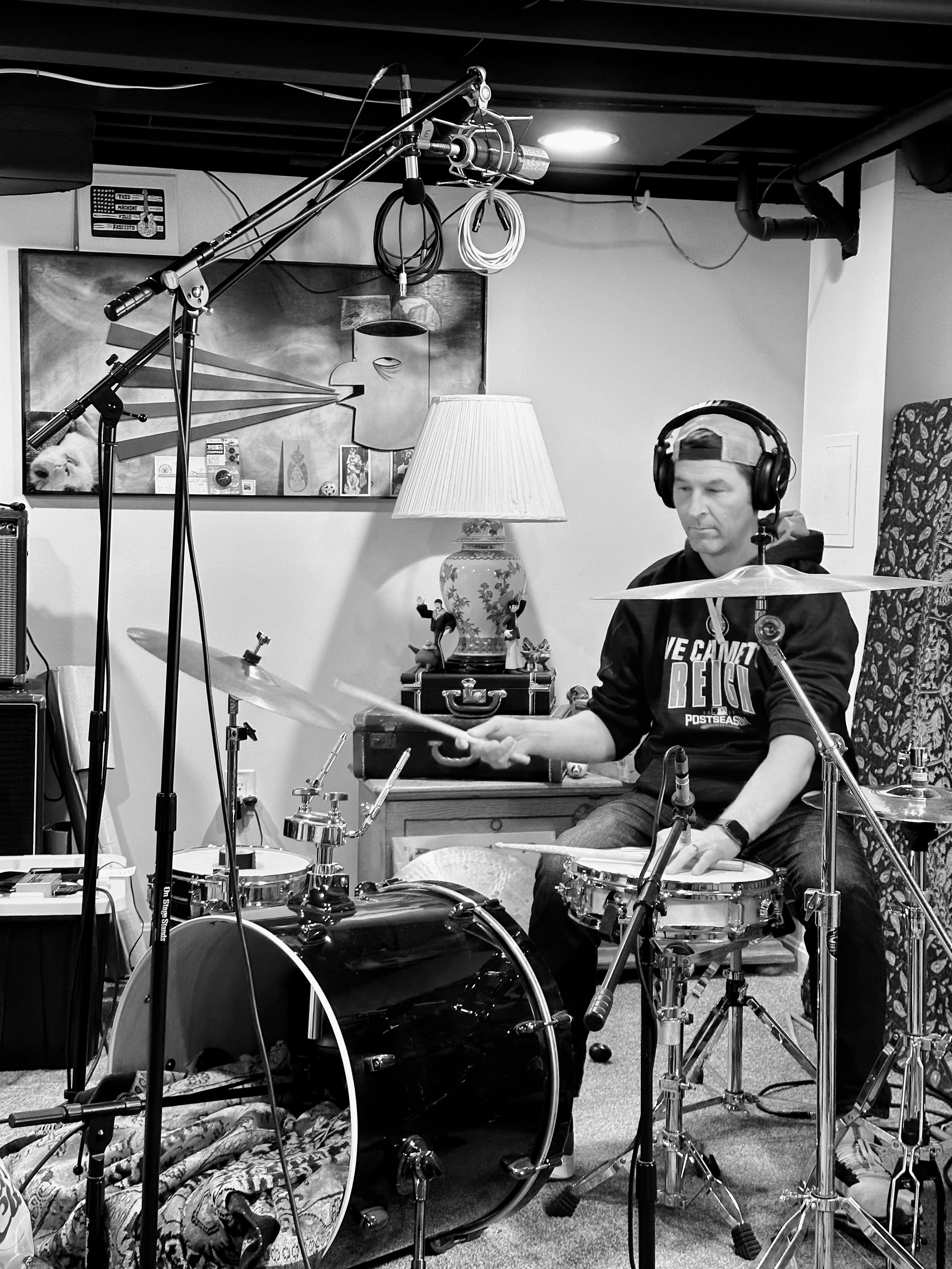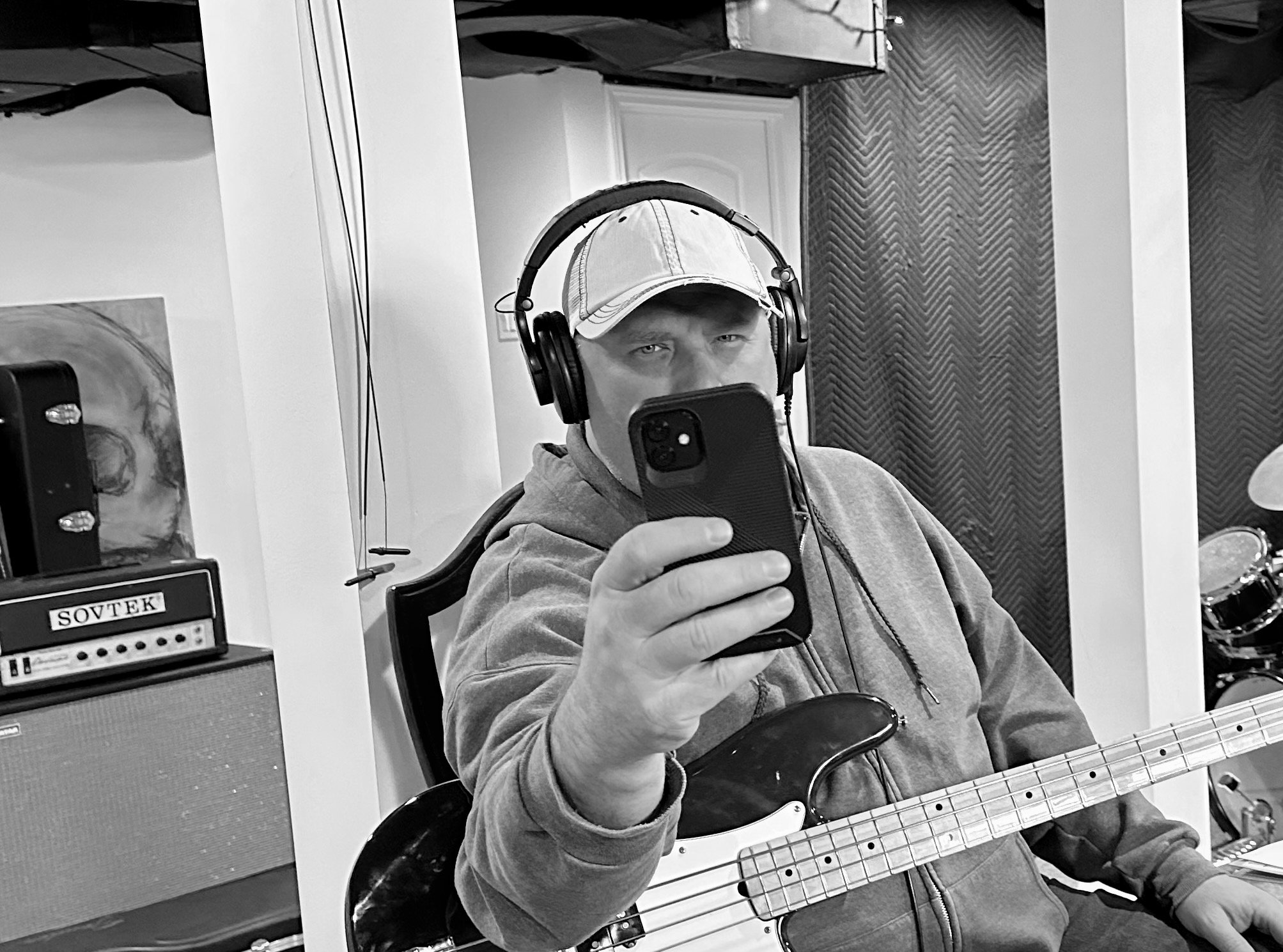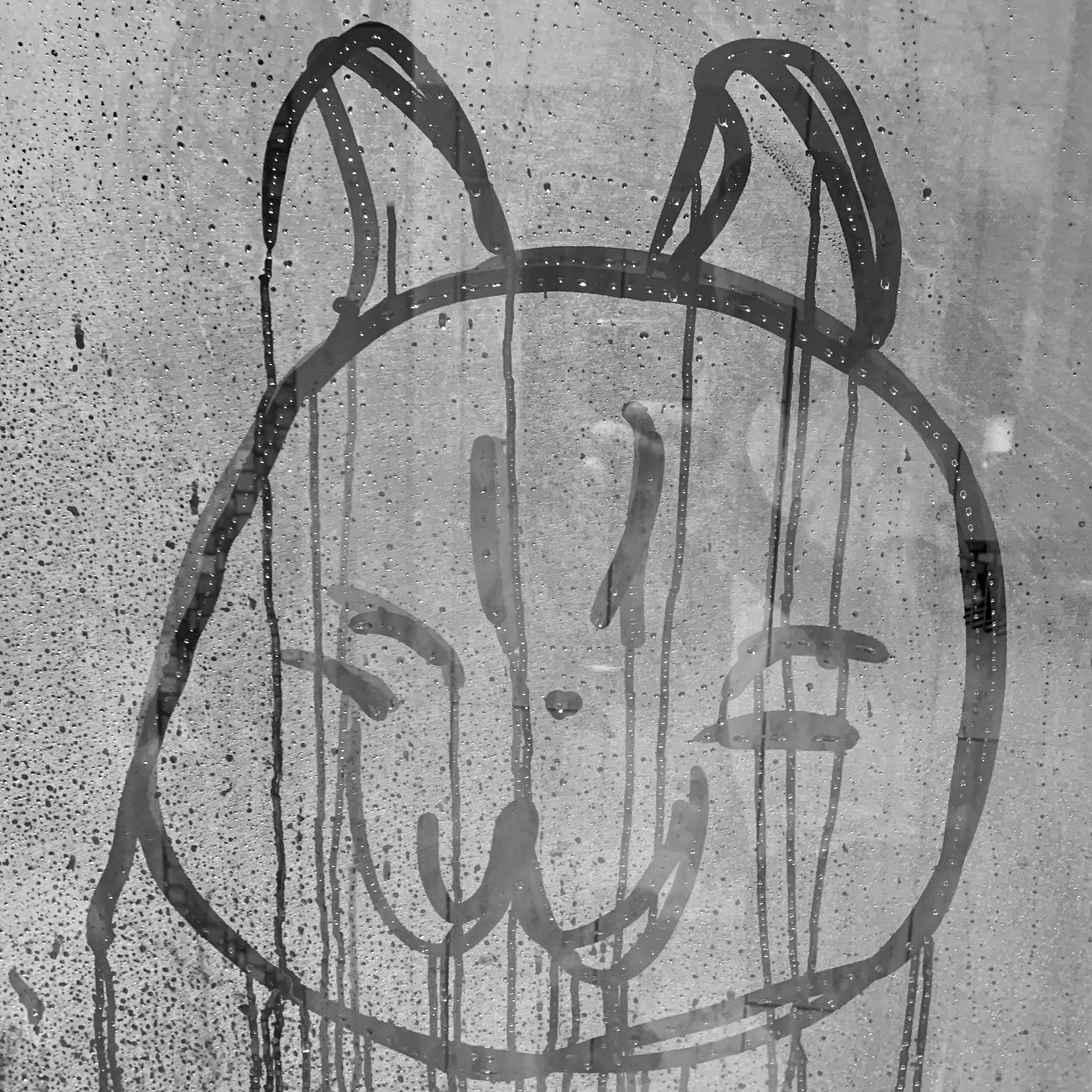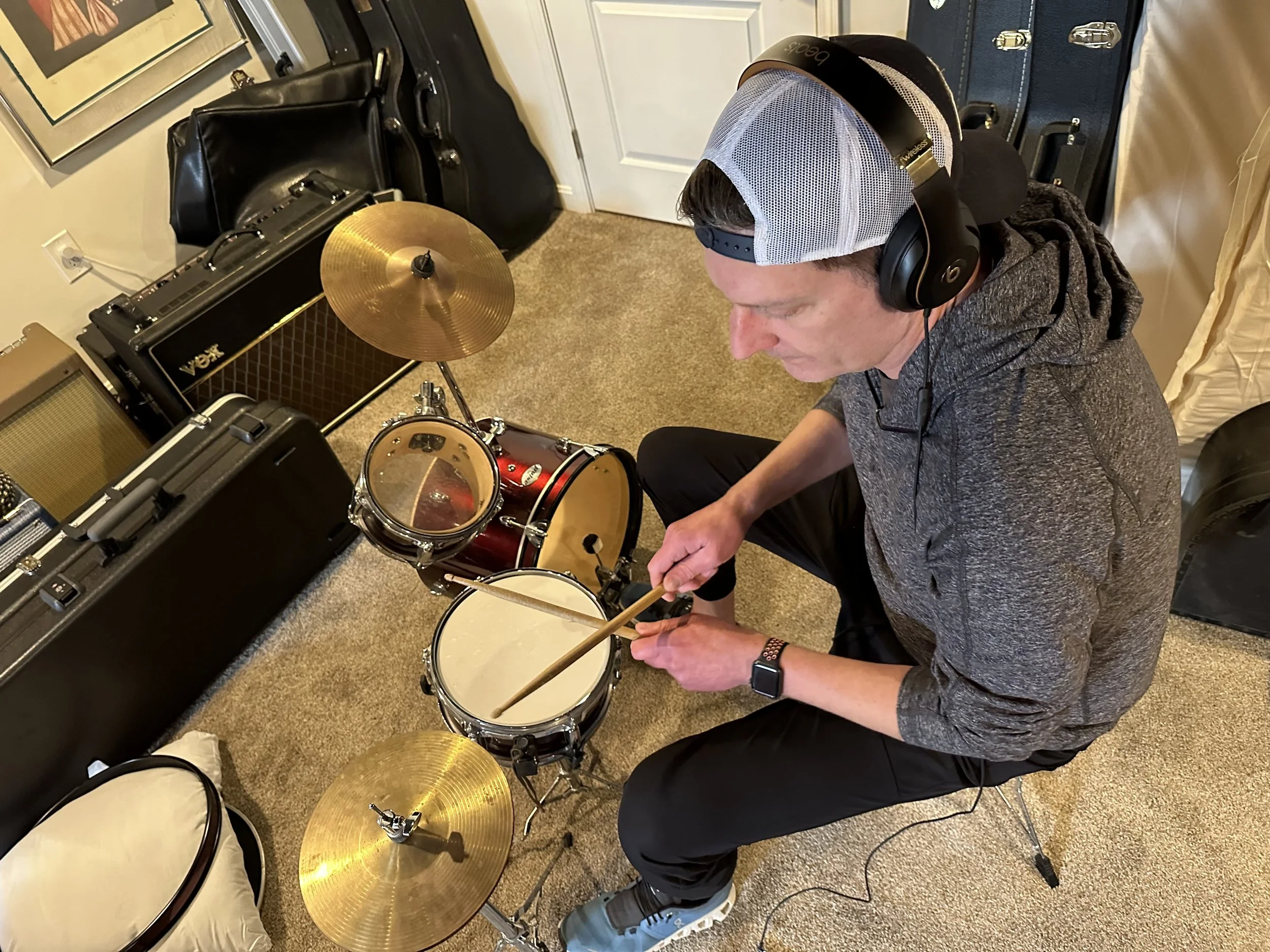Ben's Woes and Triumphs: A Bass-man’s Tale
My guitars were falling apart.
As of five years ago I had around four bass guitars left in various states of being, none of them in great shape.
Like this one I’m wielding in the photo: It stopped working around 12 years ago, coincidentally around the same time that Mayan Calendar ran out. The sound it made was garbled, pieces were falling off, the strings refused to stay in tune, and I honestly have no idea why.
But there was no pressing need to get this bass or any of the others up and running. There was no official “final” Digby show, the last time we played together just sort of happened and we didn’t realize it.
One of the last times I CAN remember we played as a band was at my wedding reception. You’d think I’d have other things on my mind, true, but Paul, Mark and Rich all agreed to play a few songs after the cake was served. Besides, we were all dressed in matching tuxedos – it’s like we HAD to play as a group. Still, I suppose part of my reason for asking Digby to play at my wedding was I wanted to show my relatives what I had been doing all those years I had spent NOT becoming a doctor lawyer astronaut.
That was in November of 2011. If it wasn’t the actual last time, it was close.
The five of us kept going as pals. Even when the schedules of real life threw up too many roadblocks for in-person meet-ups there was always texting back and forth. We all dipped in and out of a never ending digital conversation that is still going on to this day.
But if more than, say, four months ever managed to slip by without an in-person check-in I think we all sort of developed a sense of unease … Then the inevitable message would come in from Rich reminding us that we hadn’t seen each other for a bit. We’d agree, and he’d give us the coordinates to meet up for drinks and laughs. And for a little while we would just “be” together again like the old days.
In the immediate years that followed I often thought about playing music again in a band setting. Strumming your guitar at home is fun for sure, but personally I missed playing in a group. Problem was the Digby experience had spoiled me, because I never seemed to find the right band situation that met my admittedly unrealistic expectations. A lot of “It’s not you it’s me” conversations were had. My wife suggested I just find some uncomplicated old guys with banjos, an idea I would gladly embrace given the opportunity. My body was made for overalls. But for some reason old banjo-playin’ coots had fled south Indiana.
So my battle-weary bass guitars and amplifiers stayed in the closet more and more. Deteriorating. No pressing need to get them fixed up. But … it still kinda bugged me. A nagging feeling. Maybe I needed at least one to be ready?
A few years ago that nagging feeling convinced me to at least get all of my old bass guitars out of storage and assess the situation.
The oldest bass I had hanging around — literally — was an antique from 1967, a “National” hollow-bodied arch-top bass monstrosity. It had decayed to such an extent that I retired it from active service decades ago, and it had been reassigned as “interesting wall art”, now hanging in my home office.
That bass was used mainly in the late 1990s when the band that would become Digby was playing In trendy Louisville coffee houses and hip art-house restaurants like the Rudyard Kipling. We called ourselves “100 Acre Wood” in those days.
I bought that National bass from a frustrated salesman at Louisville’s Guitar Emporium – and at a huge discount. I think I was the first person to show any interest in it and they wanted to get rid of it, since legitimate bass players recognized the very real problems with it. Not me! I had dreams and hoped its “hollowness” would complement the mainly acoustic sound we had back then. And it did, for a while. Until we got loud.
I went through several basses after that, everything from Epiphones to Danelectros and Fenders, my experimental years. They were all long gone, but the only surviving example I still owned from that time was a genuine Hofner Beatle Bass. I didn’t have it on hand though, ages and ages ago I had lent it to Paul for one of his projects. Consequently neither he nor I had touched it in years, and it now lay hidden somewhere in his basement. That bass was nice but it was never the most reliable tool at the best of times – weird and fragile – and I could only guess at its condition after years of neglect.
The main bass I played all through the Digby years was a black Rickenbacker, and something had gone screwy with its pickups resulting in a garbled sound. Looks-wise it showed minimal wear and tear which surprised me … that black Rickenbacker had followed me through thick and thin on every road trip and every album and every show we ever played from the top of the Colorado mountains down to the sea-level bars of Miami.
But looks aren’t everything, the electronics had gone wacky and unfortunately I had never developed a knack for guitar diagnostic or repair. Unless you count that one time when my musical colleague and fellow Rickenbacker fanatic Rob Marlin taught me how to use an industrial-strength marker to make the binding appear more “vintage.” I still owe Rob a beer for that, the best fashion advice I ever got. But that’s as close to “maintenance” I ever did to the thing.
Surprisingly the one bass guitar with the most promise was the cheapest thing I ever bought. Back when Digby started to travel more around 2002 I figured I’d need to bring along a reliable backup guitar if the Rickenbacker bass ever failed on a road show. Our favorite guitar shop at the time was Clarksville’s Pro Sound Music, and I asked the proprietor Jeff to show me his “cheapest” bass. He pointed me towards a Squier brand precision bass. It was essentially a starter bass, a student model. The kind of economy investment instrument that parents will buy their kids for Christmas when they know they’ll lose interest in a week.
“Perfect!” I thought, “if somebody steals it in Tennessee the joke will be on them.” I picked out a blue one to match my eyes, and since I’d be traveling with it in a packed van I got a hard shell case — which incidentally cost more than the actual bass.
And that blue bass guitar went with me everywhere the Rickenbacker did … only it never left its case. Consequently it was now in the best shape of my remaining guitars, but it still needed a little work. For one thing the neck was weird, being a cheap guitar with low quality wood it had developed a slight but noticeably odd curve.
But again, I was in no hurry. No real need to fix it up.
Until there was a need.
While Digby had stopped making music, Paul had not. Far from it. Sometimes he’d email me lyrics asking for my opinion, which I always felt was a great honor. I could tell that he was just constantly evolving, going from strength to strength.
Paul continued to write and record to such an extent that he released at least two full albums of beautiful and wonderful stuff. The first album he did all the music and instrumentation himself, hence the reason I had lent him the Beatle bass guitar that ended up lost in his basement. But for the second album he asked friends to come and play on it, including Mark and his son Oscar on drums and guitar, and me for a few songs. And the only bass I had in decent shape was the cheap old blue one.
I used it for that project but wasn’t completely happy, the instrument was giving me fits in both its feel and sound. I didn’t think they were major problems, just things a competent repair guy could easily fix. But, I thought if Paul ever calls on me again, I gotta be ready with something quality that would actually work.
I took the cheap ol’ Blue bass to a brilliant guitar repair guy in Corydon named Chad. He took one look at it and said the neck was wrecked. The cheap wood had warped in a way he couldn’t straighten without further damaging the rest of the neck.
No problem, I thought: I’ll just buy a replacement neck from eBay. Oh and while I’m at it I’ll get new “vintage” sounding pickups to fix that dull sound output problem. And maybe I’ll get some new tuning machines too, the old ones were kinda hard to turn. Hell, since I’m replacing all that crap let’s get a new high mass bridge … and before I knew it my cheap ol’ Blue bass had turned into a Frankenstein monster of old and new components. And it worked. Everything just worked amazing.
Something had happened. Slowly I began to play that new/old Blue bass more and more for fun. Every now and then I’d even get to take it outside of the house, like when our pals Kevin Gibson and Butch Bayes would host a “Spinal Tap” night and ask for extra bass players to come and beef up the big bottom.
Sometimes I was asked to sit in with a folky church group on Sundays, or to accompany my cousin Butchy Stilger as he stormed the local farmers market scene. And each time I played out it was with ol’ Blue, and I was loving the experience.
And one day I realized that ol’ Blue, my dirt-cheap afterthought of a backup guitar, had turned into possibly my favorite bass of all time.
“Huh” I thought….
So it was nice to finally have one great go-to instrument again. But, again, there was still no pressing need to get the rest of my crap up and running.
While all of my bass shenanigans were going on Digby was still regularly meeting up and just enjoying telling old war stories and new war stories from modern family life. John, who had moved down south a few years ago, was now back living in Indiana with his husband and one day he was there at the meetups as well, stepping back in like no time had passed. Things felt complete again; I didn’t realize that for several years I had a John-shaped hole in my life that needed filling.
Around the beginning of 2022 Paul told me about a new batch of songs he had written, and even sent me some test recordings. Really great stuff I thought – and after a while Paul started asking if we’d be interested in playing on more robust recordings. I was game, after all I had ol’ Blue back from the shop and was ready to try it out in a studio setting. I assumed Mark would be cool to play drums again like he did on Paul’s past projects. Hell, John was back in town, it’d be a blast to get him to help. But what about Rich?
Like me over the recent years Rich had been assessing his guitar and amp collection … but while I was looking to repair mine, Rich was actually thinking about selling his! He still loved music – he had really just moved on. He explained to me once that so much time had passed that the thought of playing music simply didn’t interest him much anymore. I understood this actually, I had similar feelings off and on over the years. Maybe, like me, Digby had spoiled him?
And that’s how things stayed, until another get-together in July of 2022, during a warm summer evening in an outdoor restaurant. All of our significant others happened to be there with us, and they immediately brought up how fun it would be if Digby all played again, maybe in public, and which songs we should dust off and who they could invite and where it could be held. I remember I just sort of nodded along, but it was a crazy thing to watch develop – like a line of dominoes being pushed over.
Mark also nodded in agreement. Paul suggested that instead of just playing old stuff we could get together and work on his new songs here and there … for fun, no pressure – just see what happens. Suddenly Digby wanted to come back, and Rich finally agreed.
Over the next couple of weeks we all discussed ideas over text messages. At first there were no deadlines discussed or project goals stated. It was just all of us jumping in when our free time lined up.
Practice space to work in was no problem. Over the years as Paul had continued to write music he had also developed into a solid producer as well. He had built himself a home studio in his basement, so we had a cozy place ready made to work, practice and record.
In a basement … it’s always a basement.
The history of Digby, in a nutshell, is a series of basements. The five of us started playing music together around September of 1994. That was in the basement at Rich’s parents house in New Albany. That’s where we learned to work together, and made recordings for our first album, all in that same basement.
When the increasing volume of a four-times a week practice schedule got too much for Rich’s parents we moved on to the basement at John’s parent’s house. A few basements later we were in the bottom floor foundations of a carriage house that Rich and I rented. For a while we also practiced in Mark’s attic, which is a sort of reversed basement when you think about it. Prior to recording the “Go Digby” album, our producer Todd Smith had us rehearsing in the basement of an office building on 4th Street in Louisville.
Ultimately we ended up in the basement of a tiny house I bought in New Albany. That basement served as home base for the rest of our professional career. I’m pretty sure a pair of Mark’s tube socks are still there to this day.
And now we were back in a basement, recording a new Digby album, at Paul’s house. When we release these songs it will be the year 2024, a mere thirty years since we first gathered at Rich’s basement in ‘94.
I suppose describing Paul’s recording space as a simple “basement” does not do it justice. There are no exposed cinder blocks in the walls or a concrete floor with leaking water and exposed wire … which was more or less the practice setup at my old basement. Never knowing if you’d be electrocuted really added a touch of danger to our creative process in those days.
Paul’s basement is in all honesty nicer than some recording studios we’d worked in. And definitely nicer than my first apartment. Or my second. In fact if Paul ever wants to sublet his basement I intend to move my family there.
The first time Mark, Rich, Paul and I sat down there with instruments to play was surreal. I was sitting there all tuned up with my ol Blue bass, but I felt both nervous as well as excited. What if this didn’t work? I had not directly played with a drummer in a very long time, but the minute Mark started tapping the count on the snare I just felt like I’d come home.
In that first run through we played old Digby songs, trying to recall how we did certain musical passages and being equally amazed at both what we’d forgotten and what we could remember. And it was fun. But at the same time it felt more like an exercise, a refresher course to get the collective muscle memory going. We really came alive when we turned our attention to Paul’s new songs. Suddenly we were playing off of each other, experimenting with different approaches, discussing what would work and what wouldn’t … that for me was when I knew Digby had come back.
And so for the next year through 2023 we would come down to Paul’s basement every Saturday morning. Starting with drum takes, and working our way up to vocals on about 20ish new songs that eventually got whittled down to 12.
Rich was so taken with the project he bought a brand new Telecaster … which amazed me because it was not that long ago he had been seriously talking about selling every guitar he had.
For the first recording session I brought my old Digby bass, the Rickenbacker, as well as my new improved ol’ Blue bass. We also dug out the old Beatle bass from under a stack of guitar cases in the basement corner. When I opened that case for the first time in what had to be at least 7 years my heart kind of sank. The bass was in one piece but a lot of the chrome had tarnished, the tuners seemed brittle and unresponsive, and it desperately needed some neck care. And it smelled musty, like it didn’t want to be touched!
There was one new song we thought might sound good with the Beatle bass, so I plugged it in, tuned it up, started playing and BANG broke the G string before the song was over.
Aw well, I rolled up the broken string and hung it up on one of Paul’s rafters.
I next moved to the Rickenbacker, and despite some tinkering that had managed to coax a response from the pickups, it did not produce a sound anywhere close to its glory days. So that’s two down for the repair shop.
That left ol’ Blue. My new favorite. My former afterthought cheap backup bass. And you know what? It rocked. It felt good, it sounded good. Paul and I liked it so much we used ol’ Blue on every song.
In the summer of 2023 Paul’s wife Gina had a birthday party, and she asked if we could play some of the new songs. So we set up in the backyard, and for the first time in over a decade we played together as a group in front of people. I suppose it wasn’t a technical “reunion” show because John didn’t play, although he was there in attendance and listening. He still had some keyboard and violin parts to work out and record. But it was a promising start, we could still hold it together in front of people.
We played about four or five songs, and then Paul played some solo acoustic. One song in particular was about “kittens” getting the courage to “dance,” and it was my 8-year-old daughter Gemma’s favorite of the new stuff we had worked up. When Paul played it that night he had no idea that she had snuck behind him and was acting out the words and dancing.
Again, a good sign? Do the kids today like this stuff?
As 2023 wore on into September the project was coming together and we started talking about designing the physical record cover, which meant the album now needed a title, a name, something snappy to tie it all together. An early favorite of mine was to call it “Life After Debt.” A couple others I liked were “Most People are Average” and “A Likely Story.”
What we eventually decided on for an album title was “A Happy Little Heartache,” taken from the first verse in the new song “Too Cool.”
Rich had lots of ideas for the album cover art, and was sending us photos to consider, images that he took here and there as he walked through life. One great photo showed tree leaves that I swear formed a pattern that looked exactly like the horsehead nebula.
But the one that really caught our attention more than everything else was a photo he took of a bathroom mirror while his family was on vacation. A hot shower had made the glass fog over, which for some reason inspired Rich’s daughter Isla to draw the face of a cat. We loved it – her mirror sketch in a weird way reflected the sound of the new record, all fluid and natural.
It didn’t hurt that at least two of the new songs were loosely based on cats – and every kitty owner knows that when it comes to felines you can’t just love them and expect equal cat love in return. You give the cat your love freely and feel honored when the cat accepts you. The word “owner” is probably not accurate either, it’s really a messy relationship. Several of the songs touch on this actually, the messiness of it all. And the beauty.
So in that regard Isla’s mirror cat seemed to capture the spirit of the project – No straight lines, but organic with a touch of the chaotic.
That spirit has also been fun, laid back, creative, uncomplicated. Just being able to make music again — with these particular guys again — is a feeling that’s hard to explain. I can’t remember a time in all our years as a band where it has been this rewarding. Age will do that.
There are special little touches in each song that might be difficult to hear in the final product, but trust me there will be a few sonic surprises. One song features a percussion part consisting of Mark slapping his thigh with a drum stick for three solid minutes – he couldn’t walk straight for days. Listen closely and you might hear where Rich hits a cut out section of genuine rail road with a hammer. I’m crossing my fingers in the hopes there will be a hidden track of John cursing up a storm buried deep in the mix.
One session I had to miss but really regret not witnessing was a simultaneous double drum take for the song “Love is Love” — Mark played on his normal kit and Rich played on his daughter’s tiny student drum set. It sounds like a Macy’s parade when I hear the raw track.
I found myself open to even attempting backing vocals, something I never really got the hang of in the old days.
Around October the songs were reaching their final stages as John was able to add his parts. I spent a few evenings sitting in the basement studio and just watching John and Paul collaborate on parts and experiment with sounds. As I mentioned earlier Paul was acting as both recording engineer and producer, and he was great at it. All those years making recordings for himself and others had paid off, and he was able to get the best from all of us. And damn it felt right.
This whole experience has felt right. I love these crazy guys. This has been pure fun. We have had zero arguments, unless you count the ongoing argument we’ve had with Mark since 2004 over whether a cat’s eyes can see in 3D or 2D.
As I write this it’s now late December 2023. Everything has been recorded, and it’s now down to the mixing stages and final mastering, courtesy of Rich and Paul. I hope anyone reading this will be interested to hear the final product, I know I am.
Since my bass parts were finished recording months ago I took the opportunity to take ol’ Blue, the little bass guitar that could, back to the repair shop for a once over. If we do get to perform live again soon, I wanted to make sure it was still gonna hold up.
Wouldn’t you know it, I just couldn’t resist asking the guy to make a couple more improvements. How about a metal pickguard? Changes for the even better-er I hoped.
And that’s where my ol’ Blue bass is now as I write this — at the shop in Corydon. But you know, it’s now occurring to me that the extra work I’m requesting might backfire. Is it a mistake? What if further tinkering with the bass accidentally erases the things that have made it sound and feel special? Will it unwittingly kick out whatever magical mojo it had somehow gained?
I just have a nagging feeling it’s gonna sound different. And the only time I captured how good it truly was has been in the recording of these new songs. This new album just might be a snapshot of what my new favorite bass could do and sound like, now lost forever. Oh well. A happy little heartache.




















